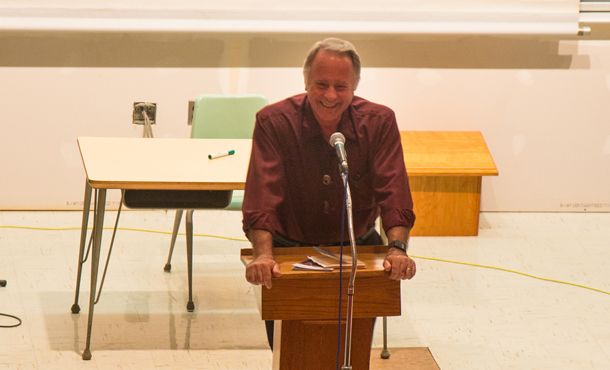Alcoholism is not just a bad habit, weakness, or sin, but a disease with distinct physical symptoms, said local physician Sam Showalter ’65 in the kick-off talk for the 2014-15 Suter Science Seminar series.
Showalter was a medical director of an inpatient facility in the 1980s that detoxed and educated more than 1,000 people addicted to alcohol and drugs. People who went through that program and aftercare for one year had a 90% chance of long-term recovery, he said.
Showalter discussed addictions to alcohol, nicotine, work, and pornography, among others. He also referenced Gerald May, author of Addiction and Grace: Love and Spirituality in the Healing of Addiction, and an anonymous article in Leadership Journal, called “An Anatomy of Lust,” in which the author discusses his addiction in a blunt and personal way.
Showalter dedicated much of his lecture to alcoholism. “If alcoholism is not a disease, than neither is sugar/diabetes, because they are almost exactly the same disease. They work the same way,” said Showalter.
An alcoholic or diabetic liver will treat the substance, either sugar or alcohol, differently than a healthy liver, he said. A normal liver will turn alcohol into a substance similar to vinegar. Explaining the disease in simple terms really benefits the patient, Showalter emphasized. For example, an alcoholic might be told that his or her brain makes increased amounts of dopamine, a chemical similar to morphine. “I think helping them to understand the physiological process… has really been one of the best motivating things that I’ve found.”
Many challenges interrupt the ability of doctors to treat addictions. Most insurance companies won’t pay for 28-day inpatient programs. Sometimes, the withdraw symptoms can make cold-turkey quitting dangerous without medical supervision – and gradual withdrawal may initially require a case of beer daily for a patient. This is not an easy population to treat: people with addictions tend to be less than honest to themselves and others. Despite these hardships, Showalter enjoyed a considerable degree of success in his practice at the Arlington (Va.) Treatment Center in the 1980s.
The repercussions of addiction affect people more than mentally and physically. Addiction has spiritual implications as well. Showalter cited May in saying, “To be alive is to be addicted, and to be alive and addicted is to be in need of God’s grace.”
Showalter recited 62 addictions from May’s list of about 100 behavioral addictions. Many of these addictions were commonly understood addictions, like tobacco and nail biting, while others were emotions or not usually thought of as addictions, like feeling anger and owning furniture. According to May and Showalter, all humans need grace to cope with addiction.
Showalter, who is now a family physician at the Green Valley Clinic in Bergton, Virginia, has deep roots in EMU. Janice, his wife, is the daughter of his pre-med mentor, Daniel B. Suter, the man for whom both the lecture series and EMU’s main science building are named.
The Suter Science Seminar series consists of 17 expert presentations – averaging two per month – during the fall and spring semesters. Visit emu.edu/science-seminars for information about future talks.
